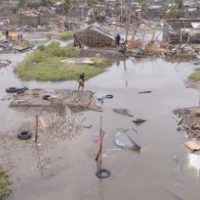-
Cyclone Idai, sanctions and capitalism
Western capitalists are to blame largely for climatic changes that causes natural and environmental disasters. Poverty, which is a result of the diabolic and pernicious economic sanctions, has forced the poor to build poor and weak structures that do not withstand the heavy winds and storms.
-
Mugabe, Land, Thatcher, Blair & imperialism
So, farewell then, Robert Mugabe, ruler of Zimbabwe for 37 years. As the western media celebrate your demise, and Zimbabwe’s people wonder what will happen next, it is worth making a note of some forgotten events that helped pave the way for your country’s crisis. As one might expect, this involves the Brits.
-
NUMSA condemns the military coup in Zimbabwe
Pressed by the military forces, the president of Zimbabwe, Robert Mugabe, has finally resigned from his seat after 37 years in power. Although his resignation was celebrated by many, the National Union of Metalworkers of South Africa warns that nothing good ever came from a military coup in Africa.
-
Rwanda, Twenty Years Later
Twenty years later, full light has not been thrown on the shooting down of the plane of the then president of Rwanda, Habyarimana. The event was immediately followed by the genocide of the Tutsis by Hutu militias. Two hypotheses remain to this day equally possible: 1) the plane was shot down by Hutu extremists, making […]
-
Greece at a Crossroads: Crisis and Radicalization in the Southern European Semi-periphery
Introduction The Greek crisis represents the deepening of a long systemic contradiction whose origins lie in the 1960s, in the stagnation of monopoly capitalism and the emergence of the South. The industrial centers of the world economy were struck by a crisis of profitability, which was displaced outward in space and forward in time by […]
-
Free Market Health Care: True Stories
I recently wrote an article about my personal experiences in dealing with the medical system while undergoing surgery (“Free Market Medicine: A Personal Account”). In response, a number of readers sent me accounts of their own experiences trying to get well in America. Health care in this country is hailed by conservative boosters as “the […]
-
Shashe Declaration: 1st Encounter of Agroecology Trainers in Africa Region 1
We are 47 people from 22 organizations in 18 countries (Zimbabwe, Mozambique, Democratic Republic of the Congo, Rwanda, Angola, Uganda, Tanzania, Kenya, Zambia, South Africa, Central African Republic, Brazil, Mexico, Indonesia, Portugal, USA, France, and Germany). We are farmers and staff representing member organizations of La Via Campesina, along with allies from other farmer […]
-
The Libyan Rebellion: The West’s Cloak over the Gulf
Fidel Castro was right. The West was planning an attack on a sovereign third world nation imminently: Libya. Nothing like a good old war against brown and black people in Libya by the West to remind oneself of what Western civilisation is all about. Many of us who have been politically active since the 1990s […]
-
Globalizing Homophobia
After September 11th, 2001, one of the liberal justifications for the military intervention against Afghanistan was the oppression of women, but also of gays, by the Taliban. People in Europe and the USA received with shock the news that same-sex couples were publicly executed in the Kabul Stadium by bringing down a wall upon them […]
-
Israel/Palestine and the Apartheid Analogy: Critics, Apologists and Strategic lessons (Part 1)
I. Introduction In the last decade, the notion that the Israeli system of political and military control bears strong resemblance to the apartheid system in South Africa has gained ground. It is invoked regularly by movements and activists opposed to the 1967 occupation and to various other aspects of Israeli policies vis-à-vis the Palestinian-Arab people. […]
-
The Myth of Conflict-Free Diamonds
The issue of “blood diamonds” has once again made the news: Farai Maguwu, Director of Zimbabwe’s Mutare-based Centre for Research and Development (CRD), languishes under the long arm of Zimbabwe’s laws on alleged charges related to his research on Zimbabwe’s Marange mines. According to a confidential 44-page report produced by investigators mandated by the Kimberley […]
-
People’s Voices Must Be Heard in Climate Negotiations
In April 2010 more than 35,000 people from 140 countries gathered in Cochabamba, Bolivia and developed the historic Cochabamba People’s Accord, a consensus-based document reflecting substantive solutions to the climate crisis. We, the undersigned organizations, both participated in and/or supported this historic process. Reflecting the voices of global civil society and the agreements reached […]
-
South Africa: An Unfinished Revolution?
The Fourth Strini Moodley Annual Memorial Lecture, University of KwaZulu-Natal, 13 May 2010 I In her historical novel, A Place of Greater Safety, which is played out against the backdrop of the Great French Revolution through an illuminating character analysis and synthesis of three of that revolution’s most prominent personalities, viz., Maximilien Robespierre, Georges […]
-
Zimbabwe’s Land Reform Is Common Sense
Zimbabwe’s land issue has generated unprecedented debates both within and outside the country. The debates, which followed the dramatic occupations of white farms by rural peasants in the late 1990s, are generally polarised between those who support radical land reform and those who support market-orientated reforms. The former stand accused of supporting Mugabe’s regime […]
-
Poverty: A Political Football in Iran among Rival Factions
Iran is not going to the 2010 World Cup, but there is another football being kicked around in the domestic Iranian media: the extent of poverty in Iran. Last month, the Statistical Center of Iran reported that 70 percent of Iranians earn less than a monthly income of $450 for a household of five. This […]
-
When the Climate Change Center Cannot Hold
After the weekend in which 350.org and thousands of allies valiantly tried to raise global consciousness about impending catastrophe, we can ask some tough questions about what to do after people depart and the props are packed up. No matter the laudable big-tent activism, let’s face it: global climate governance is gridlocked and it seems […]
-
Key Facts to Keep in Mind While Opposing War against Iran
Representatives of Iran and six of the world’s most powerful countries are scheduled to meet this week in Geneva, one of a series of events that increasingly looks like a rerun of the build-up to the 2003 U.S. invasion of Iraq. As we prepare for a barrage of anti-Iranian media spin, it would be good […]
-
The Responsibility to Protect, the International Criminal Court, and Foreign Policy in Focus: Subverting the UN Charter in the Name of Human Rights
It was just a matter of time before members of the collapsing left enlisted in the imperial attack on the most fundamental principles of the UN Charter, and added their voices to the growing chorus of support for Western power-projection under the Responsibility to Protect doctrine (R2P) and the International Criminal Court (ICC). But this […]
-
SA Political Power Balance Shifts Left — Though Not Yet Enough to Quell Grassroots Anger
With high-volume class strife heard in the rumbling of wage demands and the friction of township “service delivery protests,” rhetorical and real conflicts are bursting open in every nook and cranny of South Africa. The big splits in the society are clearer now. Distracting internecine rivalries within the main left bloc — which saw off […]
-
The Atrocity Exhibition
Some Brief Notes on Congolese History Since its inception the Congo has been raped. Its origins as a state are unique within African history, initiated, as it was, not as a colony but as the personal property of King Leopold II of Belgium; an obscene figure whose 23-year reign was cloaked in the empty rhetoric […]



![[Archive photo] The National Union of Metalworkers of South Africa (NUMSA) Picture: Reuters](https://mronline.org/wp-content/uploads/2017/11/Numsa-pic-supplied-200x200.png)